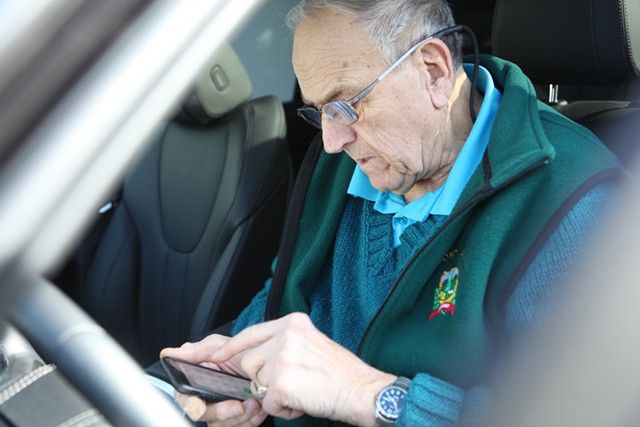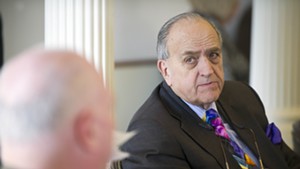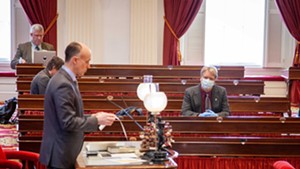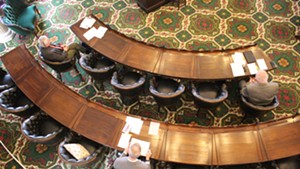
- Kevin McCallum
- Sen. Dick Mazza on a legislative conference call this week
Sen. Dick Sears (D-Bennington) couldn’t mute his cellphone during a recent conference call with colleagues, triggering some jarring reverb. Sen. Michael Sirotkin (D-Chittenden) was briefly drowned out by his dogs barking in the background.
And Sen. Dick Mazza (D-Grand Isle) had to listen to a recent coronavirus briefing from his car due to poor cellphone reception at his Colchester home.
The coronavirus is wreaking havoc on Vermont. It's even changed how the state is being governed.
Gov. Phil Scott is clearly in charge, issuing increasingly sweeping executive orders dismissing schools, limiting the size of gatherings, and mandating restaurants and bars to close for all but takeout.
But for the state’s 180 lawmakers, the closure of the Statehouse this week — and possibly for weeks more to come — means a suspension of their time-honored parliamentary traditions in favor of 21st-century technologies. For the moment, the conference call has replaced the committee of conference.
“Everybody’s learning a whole new skill set here,” said House Speaker Mitzi Johnson (D-South Hero). Since Saturday, Johnson has been participating in the daily conference call of the eight-member Joint Rules Committee from Saratoga, N.Y. She is caring for her mother, who is recuperating after a hospital stay.
Some lawmakers are still getting used to the challenges of what Johnson called “remote working etiquette.” She said not being able to see the members of the public and the media who are listening in on conference calls has been a big adjustment.
In spite of the technological challenges, lawmakers “are handling it quite well,” Senate President Pro Tempore Tim Ashe (D/P-Chittenden) said.
“People quickly moved past the fact that it would represent change and got into the business of thinking, how can we make this work,” Ashe said.
He stressed that no decisions are being made during the sessions, which would be against legislative rules. He hopes that committees work out the bugs of the teleconferencing technologies in case the Statehouse closure is extended, which looks more likely every day.
At some point, lawmakers would have to shift from discussions to decisions. It's not clear whether they'll find a way to do so remotely or return to the Statehouse.
To change the rules to allow voting from somewhere other than the Statehouse would likely require a vote — one that is not presently possible, Johnson said.
“There is a Catch-22 here that in order to make the change for us to work remotely, we’ve got to get together to vote,” she said.
Mazza believes that lawmakers will return to the Statehouse in person to vote on key bills in the weeks ahead.
"If you’re going to continue with the form of government we’ve had, I don’t see changing it now by having votes on the phone," he said.
State legislators aren’t the only ones dealing with questions about how to govern in the face of restrictions on groups of more than 10 people.
Cities and towns are grappling with a state open meetings law requiring that public meetings still have a physical place for members of the public to attend, said Karen Horn, public policy director with the Vermont League of Cities & Towns.
“The law really doesn’t anticipate this kind of a situation,” she said.
She noted Massachusetts just issued an emergency order lifting that requirement as long as access is preserved, such as through teleconferencing.
Beyond the public access questions is the impact on lawmakers themselves, a naturally gregarious bunch now isolated from one another.
Sen. Dick McCormack (D-Windsor) said goodbye to his colleagues Friday, but he’s self-quarantined alone in his Montpelier apartment. Because he spent the previous week in the “granite petri dish” of the Statehouse, he didn’t want to get his wife or grandkids in Bethel sick if he were infected but not yet showing symptoms.
He thought he might read, catch up on work and relax. The experience is not what he expected.
“I am not enjoying this exile,” McCormack said. “I really am lonely.”
















Comments
Showing 1-1 of 1
Comments are closed.
From 2014-2020, Seven Days allowed readers to comment on all stories posted on our website. While we've appreciated the suggestions and insights, right now Seven Days is prioritizing our core mission — producing high-quality, responsible local journalism — over moderating online debates between readers.
To criticize, correct or praise our reporting, please send us a letter to the editor or send us a tip. We’ll check it out and report the results.
Online comments may return when we have better tech tools for managing them. Thanks for reading.